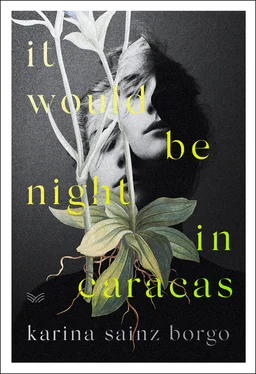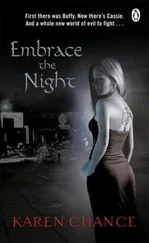She spilled these words over the closed casket of my still-warm mother.
Because, as you no doubt saw, paying the doctors, and the funeral, and the cemetery plot with the inflation as it is … Because no doubt all this cost you a fortune, didn’t it? I’m sure you still have some money saved up, but with your aunts being so elderly and so far away, you’ll need another source of income. I’ll put you in touch with my cousin, so you can put that room to good use.
Gloria didn’t stop talking about money for an instant. Something in her little rodent eyes told me she would make off with whatever there was to take from my situation or would at least improve her own circumstances by leveraging mine. That’s the way we were all living: peering at what was in each other’s shopping bag. Sniffing out when a neighbor came home with something in short supply, so we could investigate where to get hold of it. We were all becoming suspicious and watchful. We would distort solidarity into predation.
The women left after two hours, one sick of hearing the other’s indelicacies, the other worn out after failing to discover what would become of my dead mother’s estate.
Life had become a matter of venturing out to hunt and returning home alive. That was what our daily activities had turned into, even burying our dead.
“The chapel hire will be five thousand bolívares fuertes.”
“You mean five million old bolívares.”
“Yes, that’s right,” the funeral parlor employee raised his soft voice. “Given that you’ve presented the death certificate, it’s cheaper. Otherwise, it would be seven thousand bolívares fuertes, because issuing the certificate incurs an additional fee.”
“Seven million old bolívares, was it?”
“Yes, exactly.”
“Okay.”
“So would you like to hire our services?” He sounded a little exasperated.
“Does it look like I have a choice?”
“Only you know that.”
Paying for the wake was even more complicated than paying for my mother’s final days in the clinic. The banking system was a fiction. The funeral parlor had no credit card reader, they didn’t accept bank transfers, and I didn’t have enough cash to cover the quantity requested, which was something like two thousand times my monthly wage. Even if I’d had the cash, they wouldn’t have accepted it. No one wanted cash anymore. Cash was worthless bits of paper. You needed several wads to buy anything—from a bottle of soda, if you could find one, to a small pack of chewing gum, which might cost ten or twelve times what it was originally worth. Money had taken on an urban scale. Two towers of hundred-bolívar bills were needed for a bottle of cooking oil; sometimes it took three to buy a quarter kilo of cheese. Worthless skyscrapers, that’s what our national currency had become: a tall tale. A few months later, the opposite happened: all the money disappeared. This meant we had nothing to exchange for the little we could still find.
I opted for the simplest solution. I took out my last fifty-euro note, which I’d bought months before on the black market, and handed it to the funeral director, who pounced on it, his eyes lit with astonishment. He would probably exchange it for twenty times its official worth, or even thirty times what I’d paid. Fifty euros, a quarter of what remained of the savings I had wrapped in old undergarments to bamboozle any intruder. A stint for a Mexican publishing house based in Spain—they paid me in foreign currency—and overdue payments for edited manuscripts had meant my mother and I could get by, but the past few weeks had been brutal. The clinic charged for everything they didn’t have, and we had to buy it on the black market for three or four times its original worth: from syringes and saline bags to gases and cotton buds. A nurse with the air of a butcher handed over each item after naming an exorbitant price, almost always higher than the one we’d agreed on.
Everything was disappearing as fast as my mother faded. She shared a room with three other patients, lying in a bed made up with the freshly washed sheets I had to bring from home every day, sheets that seemed to soak up the room’s sickly air. There wasn’t a single clinic that didn’t have a waiting list for its beds. People got sick and died as fast as they lost their minds. I never considered subjecting my mother to a public hospital, it would have been like leaving her to die in a cold corridor, stuck between criminals riddled with bullets. Everything was ending: our life, our money, our strength. Even the days were now abbreviated. Being in the street at six in the evening was asking to cut your life short. Anything could kill us: a stray bullet, a kidnapping, a robbery. Blackouts lasted long hours and meant sunsets were followed by everlasting darkness.
At two in the afternoon, funeral parlor employees appeared in the chapel, two strong-looking individuals dressed in dark suits sewn from cheap fabric. They hauled the casket outside and threw it into a Ford Zephyr that had been converted into a hearse. I had to grab the wreath and lay it atop the casket to make it clear that this was my mother, not a platter of mortadella. In a place where death was equated with casualties from a plague, the body of Adelaida Falcón, my mother, was a cold cut, one lifeless body among so many others. The men treated her as they treated everyone else—completely devoid of compassion.
I got into the passenger seat and looked at the driver out of the corner of my eye. He had gray hair and the pitted skin of an aging black man. “Which cemetery are we going to? La Guarita?” I nodded. We said nothing further. The city’s hot wind embraced me. It had a sweet-and-sour smell of orange peel rotting inside a plastic bag beneath the sweltering sun. Driving along the motorway took twice as long as usual. In the past fifty years, the city had grown to at least three times the population that the main artery had been designed for.
The Zephyr had no shocks, so the potholed road was an ordeal. With no straps to hold it secure, my mother’s casket bounced around in the back. As I looked in the rear-view mirror at the veneer box—I hadn’t been able to afford a timber one—I thought about how much I would have liked to give my mother a fitting funeral. She must have thought along similar lines all too often. She must have wished to give me better things: a cuter lunch box, like the pink ones with gold trim that my schoolmates bought every October, not the workaday blue plastic one that she washed out thoroughly every September; a bigger house with a garden in the city’s east, not our birdcage apartment in the west. I never questioned anything my mother gave me because I knew how much it cost her. How many tutorials she’d had to teach to pay for my private-school education, or for my birthday parties, which were always overflowing with cakes, jelly, and soda served in plastic cups. She never said. Yet where the money came from needed no explaining because I saw it with my own eyes.
My mother had taught private tutorials on Tuesdays, Wednesdays, and Thursdays every week. These turned into daily sessions during the holidays for students who had to take exams in September so as not to fail a course. At a quarter to four, she would remove the tablecloth from the dining table. On its surface she would place pencils, a sharpener, several blank sheets of paper, a plate with María cookies, a jug of water, and two glasses. So many children passed through our house. They all had the same anemic look, no life in them. Overweight and indifferent girls and boys, undernourished thanks to all the chocolate and television that filled their afternoons in a city that was doing away with its parks. I grew up in a place full of rusty slides and swing sets, but everyone was too fearful of crime to play on them, and back then the crime rate wasn’t a shadow of what it came to be.
Читать дальше












